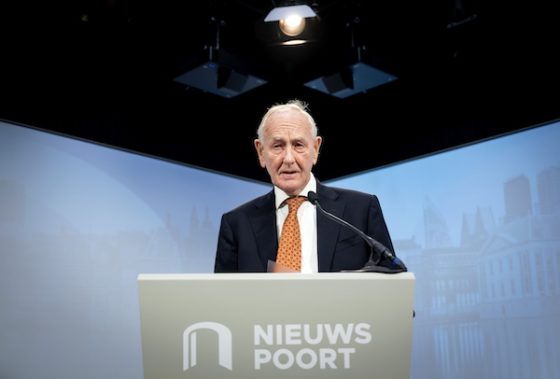Up to 600 farms will have to go to kick start nitrogen cutbacks


The government should make sure between 500 and 600 factory farms and other major polluters close to environmentally sensitive areas either change or close down within the next year in order to kick start the process of cutting nitrogen emissions, the cabinet’s negotiator Johan Remkes said on Wednesday.
Remkes, who was drafted in to mediate following this summer’s farmers’ protests, said that closing down major producers of nitrogen was the ‘lesser of two evils’ and was crucial to meet legal requirements. ‘Measures have been delayed for so long that there is no other way,’ Remkes said at the presentation of his report.
Farmers could either change their ways of working, move to a new location or close down with the help of ‘generous’ compensation, Remkes said. And while closures should be voluntary, there is no choice other than to intervene if farms do not meet the deadline, he said, avoiding the politically sensitive concept of compulsory purchase.
The government’s deadline of 2030 to reduce nitrogen-based pollution by 50% should remain intact for the time being, Remkes said, adding that it is more important to actually get started than stick to an end date.
Without action, the Netherlands will shut down because it will not be legally possible to give permits for houses, for farms or roads. ‘This also means that construction will come to a standstill, with significant economic and social consequences,’ he said.
Nature
Remkes said nature must be central in the discussions, not nitrogen or agriculture. While 40% of the excess nitrogen in the environment is down to intensive farming, 10% comes from industry, 10% from mobility and 35% from abroad, he said.
The former government minister also highlighted the resentment and rage within the farming community which had led to the protests in June and July.
‘Many farmers know that change is needed and should happen,’ he said. ‘But government policy over the past few years has fed the image that the government is not working with farmers, but against them.’
People living in rural areas, he said, are dealing with the growing divide between the countryside and cities, in terms of both cultural values and their economic position.
The Zuid-Holland town of Gorinchem, he said, where ‘the last bus stop and the last ATM have recently been removed,’ is an example of this.
Reactions
The new agriculture minister Piet Adema, described the report as a first step in rebuilding trust and in a new relationship between farmers and the government.
Mark van den Oever, leader of radical organisation Farmers Defence Force, said in response that if Remkes really is suggesting ‘600 fine farms’ are to go, ‘then we will spring on the barricades’.
‘The plans are nothing to do with saving nature and all about shrinking the farming sector,’ he said.
Thank you for donating to DutchNews.nl.
We could not provide the Dutch News service, and keep it free of charge, without the generous support of our readers. Your donations allow us to report on issues you tell us matter, and provide you with a summary of the most important Dutch news each day.
Make a donation